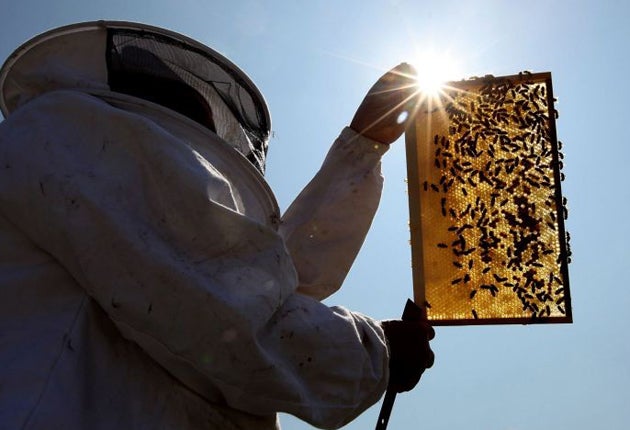Urgent review launched into bee population decline

Your support helps us to tell the story
From reproductive rights to climate change to Big Tech, The Independent is on the ground when the story is developing. Whether it's investigating the financials of Elon Musk's pro-Trump PAC or producing our latest documentary, 'The A Word', which shines a light on the American women fighting for reproductive rights, we know how important it is to parse out the facts from the messaging.
At such a critical moment in US history, we need reporters on the ground. Your donation allows us to keep sending journalists to speak to both sides of the story.
The Independent is trusted by Americans across the entire political spectrum. And unlike many other quality news outlets, we choose not to lock Americans out of our reporting and analysis with paywalls. We believe quality journalism should be available to everyone, paid for by those who can afford it.
Your support makes all the difference.The Government is launching an “urgent and comprehensive” review of why bees are declining and what is being done to help them.
Many species of bee and other pollinating insects including butterflies, moths and hoverflies have experienced declines in recent decades, raising concerns about the impacts on food supplies, gardens and the countryside.
Factors including use of pesticides, loss of habitat and more intensive agriculture are thought to be to blame.
The review will look at current policies, the evidence on what is happening to pollinators and what action charities and businesses are taking to help the insects, Environment Minister Lord de Mauley will announce in a speech.
The work will identify what needs to be done to help bees and other insects, and will form the basis of a "national pollinator strategy" which will bring together all the initiatives already under way and help develop new action.
Lord de Mauley will tell a Bee Summit organised by Friends of the Earth: "We must develop a better understanding of the factors that can harm these insects and the changes that government, other organisations and individuals can make to help."
The Government has come under fire for opposing European moves to ban "neonicotinoid" pesticides which have been linked to bee declines, but Lord de Mauley said bees would be vulnerable with or without restrictions on insecticides.
"I do not deny for a moment that it is important to regulate pesticides effectively and to avoid unnecessary pesticide use."
But he will tell the conference: "Changes in land use, the type of crops grown, alien species, climate change - these all have an impact. The relative importance of these factors and their interactions is not well understood."
The review will begin with the launch of a report on current government policy and initiatives in England, while in September a series of workshops will bring experts together to discuss the issue.
And independent experts will look at the evidence on the state of UK pollinating insects, he will announce.
Friends of the Earth's executive director Andy Atkins said: "We're delighted that enormous pressure for a Bee Action Plan from scientists, businesses and the public has stung the Government into action.
"We all agree prompt measures are needed to tackle all the threats bees and other pollinators face, but an urgent and comprehensive route map and timetable are needed to ensure this happens.
"The Minister's plan of action must be in place when bees emerge from hibernation next spring - we can't afford to gamble any longer with our food, countryside and economy."
PA
Join our commenting forum
Join thought-provoking conversations, follow other Independent readers and see their replies
Comments